Finding the right marriage counselor is crucial for couples seeking to improve their relationship and address any issues they may be experiencing.
Marriage counseling can significantly impact a couple’s communication, problem-solving, and overall happiness in their relationship.
However, making an informed decision when selecting a professional to guide this often sensitive and emotional process is important. In this guide, you will find 7 options to connect with licensed marriage counselors and tips for choosing the right one.
Want to skip right to the suggestions for marriage counselors? Here are our 7 recommended therapy options:
7 Marriage Counseling Options
Below, you will find seven online options to find qualified marriage counselors to help you and your partner address issues within your relationship and improve overall marital satisfaction.
| Provider | Good For | Location | Pricing |
|---|---|---|---|
| ReGain | Quick match with the right couples therapist for you | Online therapy | $65 to $90 per week (billed every 4 weeks) |
| Ritual | Couples guidance through proven interventions | Online service | $100 to $260 per month |
| Find-a-therapist.com | Finding and contacting the right couples counselor for you and your partner | Online and in-person therapy | Varies depending on the counselor fee |
| Online-therapy.com | Finding licensed and experienced therapists with a Cognitive Behavioral Therapy (CBT) approach | Online therapy | $40/week to $88/week (including our 20% discount first month) |
| Calmerry | Individual relationship counseling | Online therapy | $49.50 to $73.75 per week (billed monthly) |
| TalkSpace | Relationship counseling, marriage counseling, premarital counseling | Online therapy | Varies according to insurance coverage or self-pay options |
| Family Marriage Counseling | Locating the right couples counselor for you and your partner | Online and in-person therapy in the U.S. and Canada | Varies depending on the counselor fee |
1. ReGain
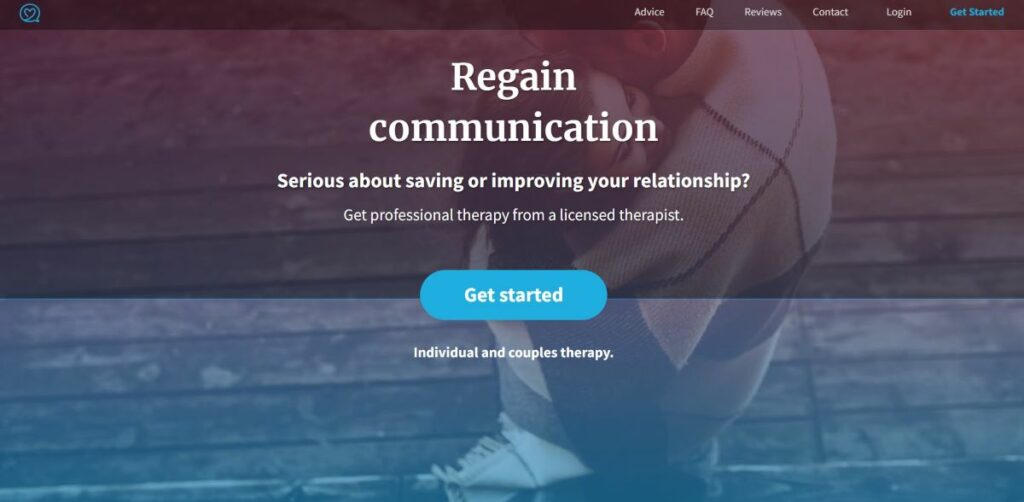
Tailored for individuals and couples navigating relationship or marital issues – ReGain is your online relationship therapy solution. Starting at $65/week, you can schedule one weekly live session and message your therapist anytime. Start your path to healthier connections with ReGain – fill out their online assessment form.
- Good for: Quick match with the right couples therapist for you.
- Location: Online therapy.
- Pricing: $65 to $90 per week (billed every 4 weeks).
- Features: iOS and Android app available, message your therapist anytime, live sessions are scheduled weekly and done via live chat, phone, or video call.
ReGain is an online platform specializing in couples counseling, including marriage counseling. There you can choose if you want to take therapy together as a couple or if you want to take relationship counseling individually.
2. Ritual

Ritual assists you in healing and transforming relationship issues into opportunities with the aid of their experienced Relationship Experts and science-backed methods. Complete the Ritual assessment to begin rekindling your relationship with 1:1 sessions with experienced professionals, personalized in-app content, guided reflections, and activities between sessions.
- Good for: Couples guidance through proven interventions.
- Location: Online service.
- Pricing: $100 to $260 per month
- Features: 1-1 sessions with relationship experts, online activities and personalized skill-building content, option to join together as a couple or on your own.
Ritual offers relationship help to make your relationship a source of joy, safety, and pride. By using proven interventions and different tools and resources, experts on this platform can help you and your partner heal, connect, and rebuild your relationship.
3. Find-a-therapist.com
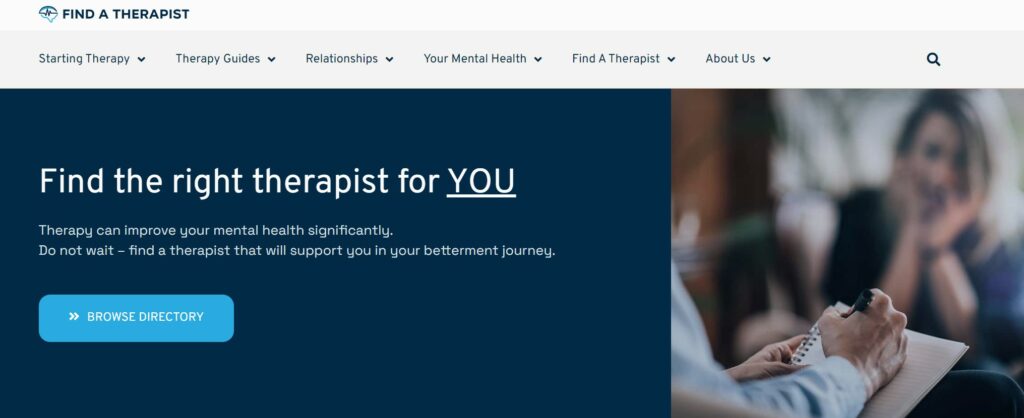
- Good for: Finding and contacting the right couples counselor for you and your partner.
- Location: Online and in-person therapy.
- Pricing: Varies depending on the counselor fee.
- Features: Filter your search, find accessible and effective online and in-person therapy, find guides on different types of therapy.
Find-a-therapist.com has an online directory where you can customize your search to find the right marriage counselor for you and your partner. You can check therapists’ profiles before making a decision. Once you select your therapist you can contact them directly.
4. Online-therapy.com
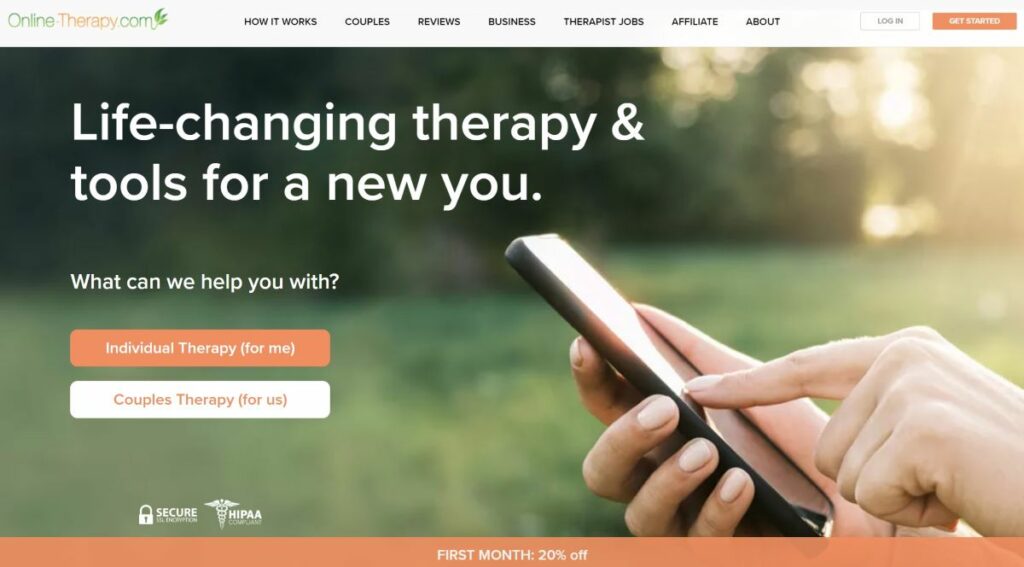
Discover transformative online therapy with Online-therapy.com. Through cognitive behavioral therapy (CBT), Online-therapy.com offers individual and couples support starting at $45/week. Engage in sessions via video, voice, or text for maximum flexibility. Fill out their online questionnaire to get started.
- Good for: Finding licensed and experienced therapists with a Cognitive Behavioral Therapy (CBT) approach.
- Location: Online therapy.
- Pricing: $40/week to $88/week (including our 20% discount first month).
- Features: Unlimited messaging with your therapist, including a daily journal and activity plan, yoga and meditation videos, and tests to see your progress.
Online-therapy.com offers different mental health services, including marriage counseling or couples therapy. Therapists on this platform are experts in the CBT approach which is very useful to identify and change negative behavioral patterns, improving your relationship.
Read our online-therapy.com review here.
5. Calmerry
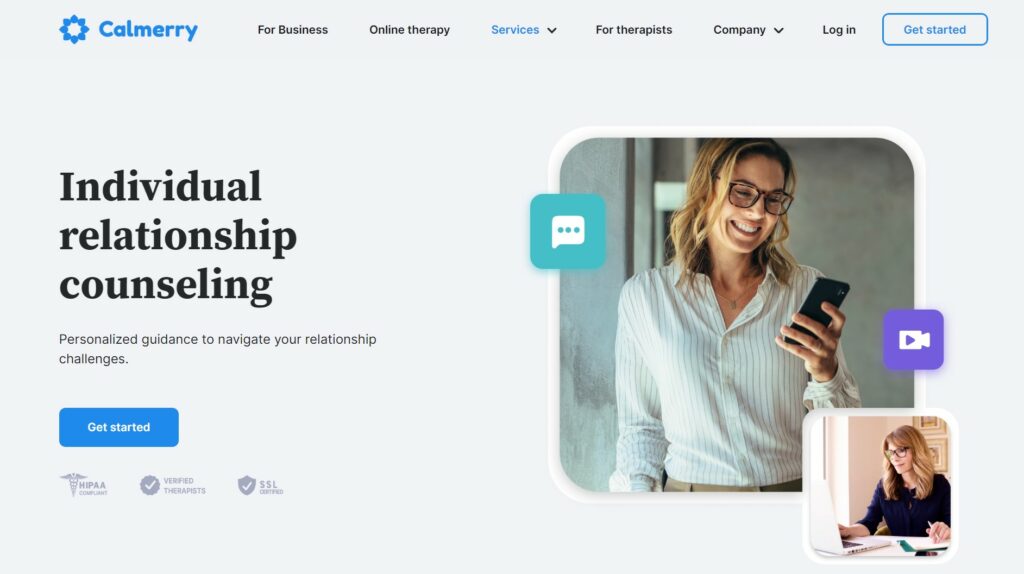
Embark on a journey of mental wellness with Calmerry. With diverse subscription options, starting at just $50, Calmerry makes prioritizing your mental health simple and accessible. You can message your therapist any day or schedule a live therapy session from the comfort of your home from any device.
- Good for: Individual relationship counseling.
- Location: Online therapy.
- Pricing: $49.50 to $73.75 per week (billed monthly).
- Features: Message to your counselor anytime, text therapy and video therapy according to the plan you choose, free counselor switching.
Calmerry offers individual relationship counseling for individuals interested in improving their marriage by exploring and breaking negative communication dynamics. There, you will be matched with the right therapist after a short questionnaire where you can express your expectations and preferences in therapy.
Read our comparison between Calmerry and BetterHelp here.
6. TalkSpace
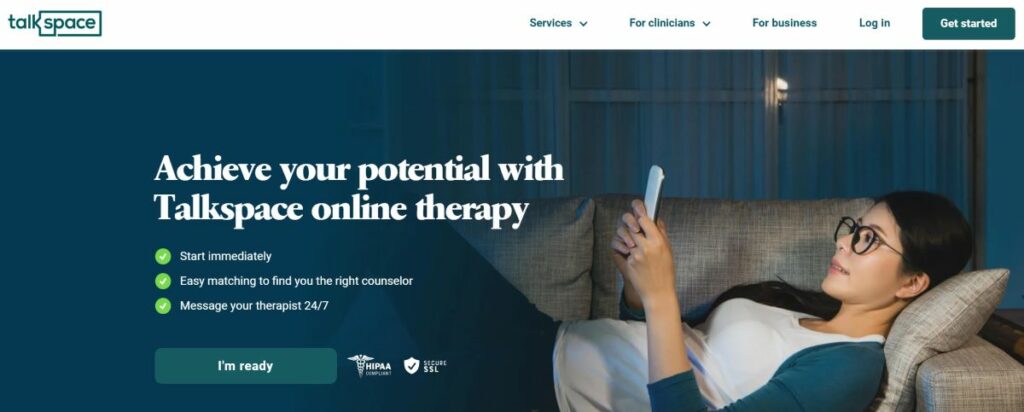
Tailored to individuals, couples, teens, and offering psychiatry services, Talkspace plans kick off at a wallet-friendly $69 per week. What’s more, many health insurances also cover their services, enhancing accessibility and affordability. Complete a questionnaire and get matched with the right therapist for you.
- Good for: Relationship counseling, marriage counseling, premarital counseling.
- Location: Online therapy.
- Pricing: Varies according to insurance coverage or self-pay options.
- Features: Accepts insurance, pick your therapist from a list of recommendations, live video sessions and unlimited messaging with your therapist.
TalkSpace is an online platform that offers couples therapy, marriage counseling, and other mental health services. To start therapy on TalkSpace you must fill out a questionnaire and select a therapist from a list the platform provides according to your answers.
Read our TalkSpace review here.
7. Family Marriage Counseling
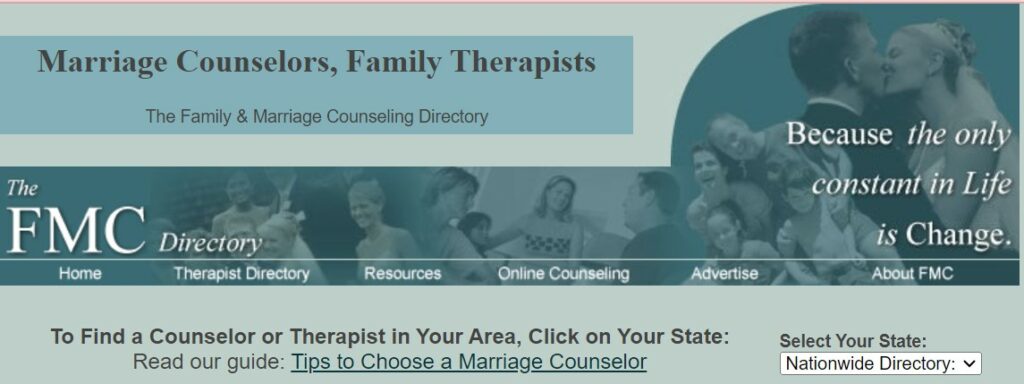
- Good for: Locating the right couples counselor for you and your partner.
- Location: Online and in-person therapy in the U.S. and Canada.
- Pricing: Varies depending on the counselor fee.
- Features: Therapists directory, can be utilized free of charge, contact therapists directly via phone or email.
Family Marriage Counseling is an online directory where you can search for couples counselors near your area. There you can filter your search by location and other categories. Once you choose your therapist, you can contact them directly according to the information on their profiles.
Understanding Marriage Counseling

Marriage counseling, also known as couples therapy, is a type of psychotherapy that helps couples identify and resolve conflicts, improve communication, and gain a deeper understanding of each other.
It is provided by mental health professionals, such as psychologists, licensed therapists, and social workers who specialize in working with couples.
Couples often seek marriage counseling when they encounter challenges in their relationship, such as communication issues, infidelity, trust issues, or disagreements about parenting or finances.
The purpose of therapy is to help couples gain insights into their relationship, develop healthy patterns of interaction, and nurture a stronger bond.
Marriage Counseling Process
During the initial sessions, a skilled therapist will work to establish a safe, non-judgmental environment for the couple to express their feelings and concerns.
Throughout the process, the therapist serves as a neutral mediator, guiding the couple toward effective communication strategies and practical solutions.
One of the main goals of marriage counseling is fostering emotional intimacy and connection between partners.
This is achieved by helping the couple understand their individual and partner’s needs and effectively address those needs within the context of the relationship.
Couples therapy also aims to improve overall mental health, as unresolved relationship issues can sometimes contribute to anxiety, depression, or stress.
Knowledgeable and Experienced Therapist
To find the most suitable marriage counselor, it’s crucial for the couple to consider their own preferences and needs.
This may include finding a therapist with specific expertise, such as working with blended families or dealing with infidelity.
Moreover, it’s important to feel comfortable with the counselor, as a strong therapeutic alliance is essential for success.
In some cases, online couples therapy might be a more convenient option, particularly when physical distance or busy schedules hinder in-person sessions.
Qualifications of a Good Marriage Counselor

A good marriage counselor possesses a combination of education, professional credentials, and experience working with couples.
They should hold at least a master’s degree in counseling, psychology, or a related field.
Additionally, they should maintain a current license as a marriage and family therapist (LMFT) or as a licensed professional counselor (LPC).
Education and Licensure
A marriage counselor should have obtained their degree from an accredited institution that adheres to the high standards set forth by the Council for Accreditation of Counseling and Related Educational Programs (CACREP) or the American Association for Marriage and Family Therapy (AAMFT).
This ensures that the counselor has received a thorough education in various counseling theories, techniques, and ethical considerations.
Experience Working with Couples
When seeking a marriage counselor, finding someone with relevant experience working with couples is essential.
A counselor with a strong background in couples counseling will be better prepared to address the unique challenges married couples face, such as communication issues, conflict resolution, and intimacy concerns.
Adherence to Ethical Guidelines
A good marriage counselor should adhere to the ethical guidelines outlined by their licensing board, such as the American Counseling Association (ACA) or the AAMFT.
These guidelines provide a framework to ensure that counselors maintain professional boundaries, respect clients’ confidentiality, and act in the best interests of their clients.
Interpersonal Skills
A good marriage counselor should have strong interpersonal skills to create a safe and open environment for couples to discuss their issues.
They should be empathetic, non-judgmental, and skilled in active listening.
Additionally, they should be able to effectively communicate with clients and demonstrate cultural competence when working with diverse populations.
Starting the Search for a Marriage Counselor

Finding the right marriage counselor is crucial for the success of couples therapy.
It is important to start with a clear understanding of the couple’s goals and expectations for counseling.
This will help identify a competent and experienced professional to guide them through their journey.
Online Directories
One of the most reliable ways to begin this search is to explore online directories and resources, such as Find-a-Therapist which offers an extensive list of therapists and counselors in various locations.
By browsing through profiles, couples can find detailed information like the therapist’s background, specialties, and fees.
This initial research can help narrow down the options and create a shortlist of potential candidates.
Interview
After identifying suitable candidates, couples should plan to interview the prospective counselors.
This process can be done over the phone or during an initial consultation.
The purpose of the interview is to understand better the therapist’s approach, session structure, and how they plan to address the specific concerns that the couple may have.
It also provides an opportunity for the couple to gauge their comfort level with the counselor and ensure they feel a strong rapport and trust.
Some important questions to ask during the interview may include:
- What is your educational background and experience in marriage counseling?
- What is your approach to couples therapy, and how do you incorporate various techniques?
- How do you handle conflict resolution and decision-making within sessions?
- What is the expected length and frequency of counseling sessions?
During this process, couples should also clarify any logistical concerns such as scheduling, fees, and insurance coverage.
It is necessary to establish a clear plan for the duration, frequency, and overall cost of therapy in order to avoid any future misunderstandings or financial stress.
Coverage by Insurance
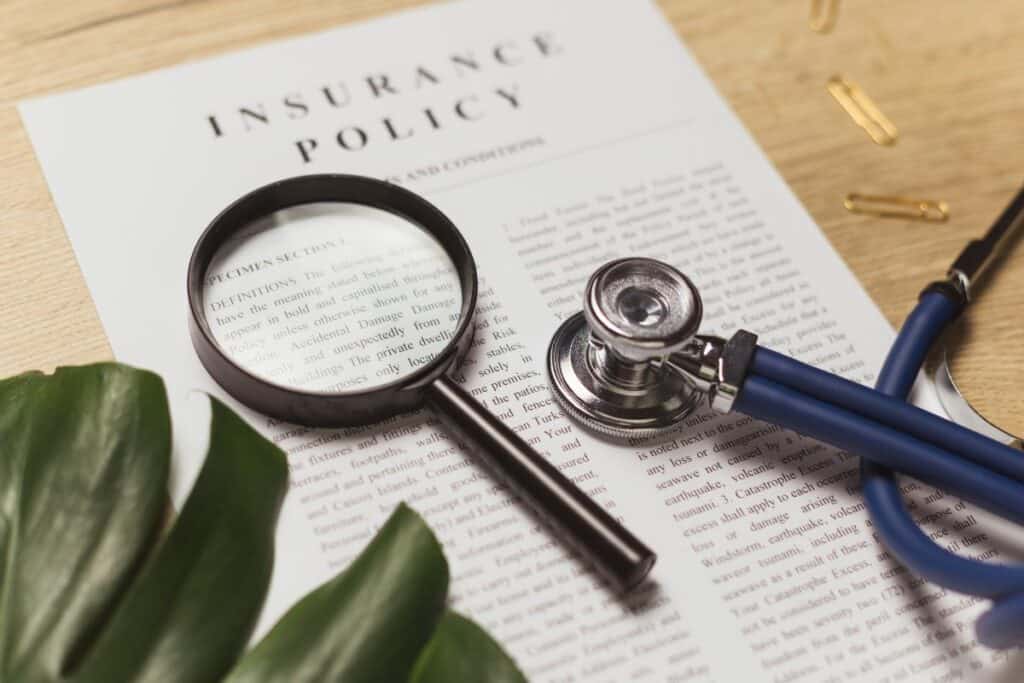
When looking for a marriage counselor, one important aspect to consider is whether your insurance plan covers their services.
It’s worth noting that not all insurance plans cover couples therapy, and the extent of coverage can vary depending on the plan and provider.
To determine whether your insurance plan covers marriage counseling, start by checking your plan’s benefits and coverage details.
This information can typically be found online through your insurance provider’s website or by contacting them directly.
Referral
In some cases, insurance coverage for marriage counseling may require a referral from a primary care physician or other healthcare professional.
This is usually necessary for plans that use a managed care model, such as HMOs or PPOs.
As a result, it is essential to consult your insurance company about any referral requirements and processes before initiating couples therapy.
Limtations and Alternatives
Keep in mind that even if your insurance plan does cover marriage counseling, there might be limitations on the number of sessions or the total cost of care.
If your insurance plan does not cover marriage counseling, or if there are limitations to the coverage, consider discussing alternative payment options with your counselor.
Some therapists may offer sliding-scale fees or payment plans based on your financial situation and needs.
Remember, investing in your relationship’s well-being is important, and finding a way to make therapy affordable should be a priority.
Therapists Specializing in Relationship Issues
Frequently Asked Questions
What qualifications should a marriage counselor have?
A qualified marriage counselor should hold at least a master’s degree in counseling, psychology, or a related field.
Additionally, they should be licensed in their state and have specific training in relationship therapy.
Experience in working with couples and a good track record of helping clients resolve conflicts are also important qualities to consider.
Is marriage counseling typically covered by insurance?
Marriage counseling may or may not be covered by insurance, depending on your specific policy and the reason for seeking therapy.
Some insurers require a mental health diagnosis for coverage, while others may offer partial coverage for relationship counseling.
It’s essential to contact your insurance provider to determine your coverage and any out-of-pocket costs.
What types of therapy are best for relationship issues?
Several types of therapy can be beneficial for relationship issues, including Emotionally Focused Therapy (EFT), the Gottman Method, Cognitive Behavioral Therapy (CBT), and Imago Relationship Therapy.
Each approach has its own strengths and focus, so it’s essential to discuss your specific needs and goals with your therapist to determine the most suitable method for your situation.
Where can I find faith-based marriage counseling?
Faith-based marriage counseling can be found through local religious institutions or through specialized counseling centers that focus on integrating spiritual beliefs into therapy.
You can also search for therapists who mention a faith-based approach on their online profiles or directories, such as Find-a-Therapist.
Make sure to inquire about their experience and approach to faith-based counseling before making a decision.







